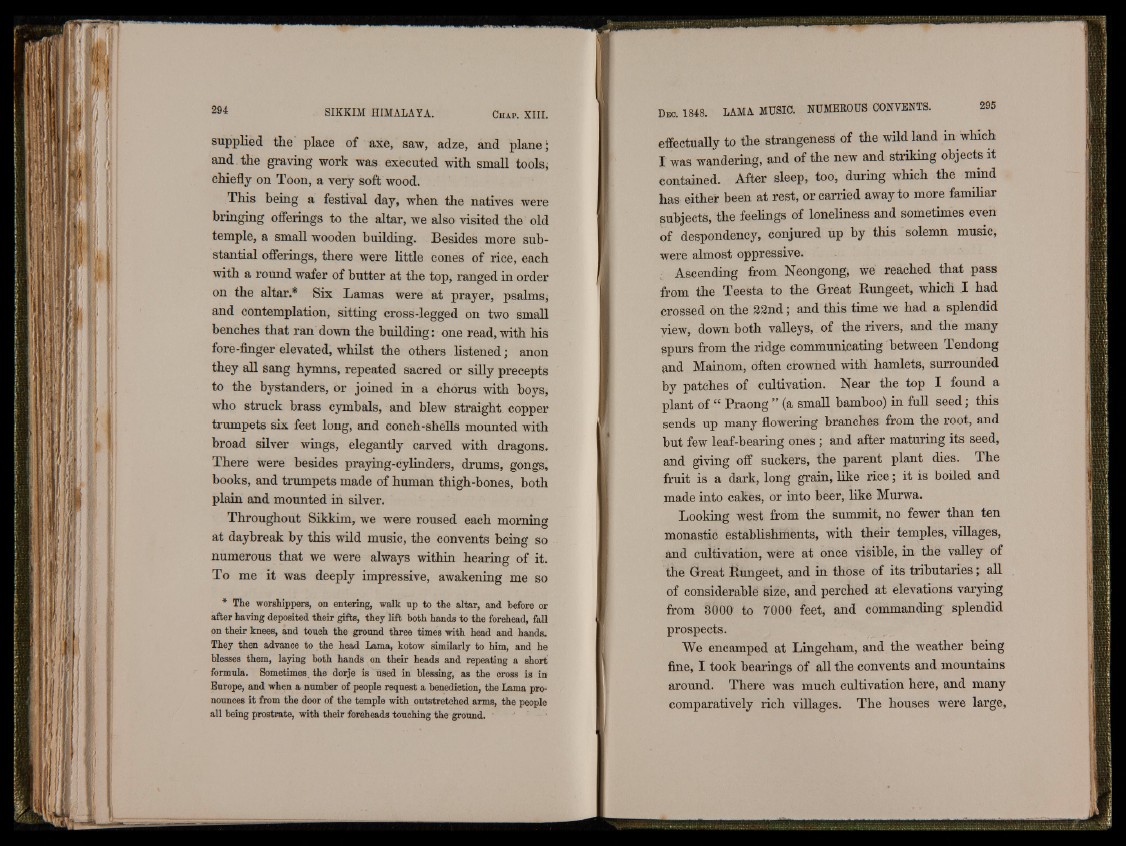
supplied the place of axe, saw, adze, and plane \
and the graving work was executed with small tools,
chiefly on Toon, a very soft wood.
This being a festival day, when the natives were
bringing offerings to the altar, we also visited the old
temple, a small wooden building. Besides more substantial
offerings, there were little cones of rice, each
with a round wafer of butter at the top, ranged in order
on the altar.* Six Lamas were at prayer, psalms,
and contemplation, sitting cross-legged on two small
benches that ran down the building: one read, with his
fore-finger elevated, whilst the others listened; anon
they all sang hymns, repeated sacred or silly precepts
to the bystanders, or joined in a chorus with boys,
who struck brass cymbals, and blew straight copper
trumpets six feet long, and conch-shells mounted with
broad silver wings, elegantly carved with dragons.
There were besides praying-cylinders, drums, gongs,
books, and trumpets made of human thigh-bones, both
plain and mounted in silver.
Throughout Sikkim, we were roused each morning
at daybreak by this wild music, the convents being so
numerous that we were always within hearing of it.
To me it was deeply impressive, awakening me so
* The worshippers, on entering, walk up to the altar, and before or
after having deposited their gifts, they lift both hands to the forehead, fall
on their knees, and touch the ground three times with head and hands.
They then advance to the head Lama, kotow similarly to him, and he
blesses them, laying both hands on their heads and repeating a short
formula. Sometimes the dorje is used in blessing, as the cross is in
Europe, and when a number of people request a benediction, the Lama pronounces
it from the door of the temple with outstretched arms, the people
all being prostrate, with their foreheads touching the ground. '
effectually to the strangeness of the wildland in which
I was wandering, and of the new and striking objects it
contained. After sleep, too, during which the mind
has either been at rest, or carried away to more familiar
subjects, the feelings of loneliness and sometimes even
of despondency, conjured up by this solemn music,
were almost oppressive.
Ascending from Neongong, we reached that pass
from the Teesta to the Great Rungeet, which I had
crossed on the 22nd ; and this time we had a splendid
view, down both valleys, of the rivers, and the many
spurs from the ridge communicating between Tendong
and Mainom, often crowned with hamlets, surrounded
by patches of cultivation. Near the top I found a
plant of “ Praong ” (a small bamboo) in full seed ; this
sends up many flowering branches from the root, and
but few leaf-bearing ones ; and after maturing its seed,
and giving off suckers, the parent plant dies. The
fruit is a dark, long grain, like rice ; it is boiled and
made into cakes, or into beer, like Murwa.
Looking west from the summit, no fewer than ten
monastic establishments, with their temples, villages,
and cultivation, were at once visible, in the valley of
the Great Rungeet, and in those of its tributaries ; all
of considerable size, and perched at elevations varying
from 3000 to 7000 feet, and commanding splendid
prospects.
We encamped at Lingcham, and the weather being
fine, I took bearings of all the convents and mountains
around. There was much cultivation hère, and many
comparatively rich villages. The houses were large,